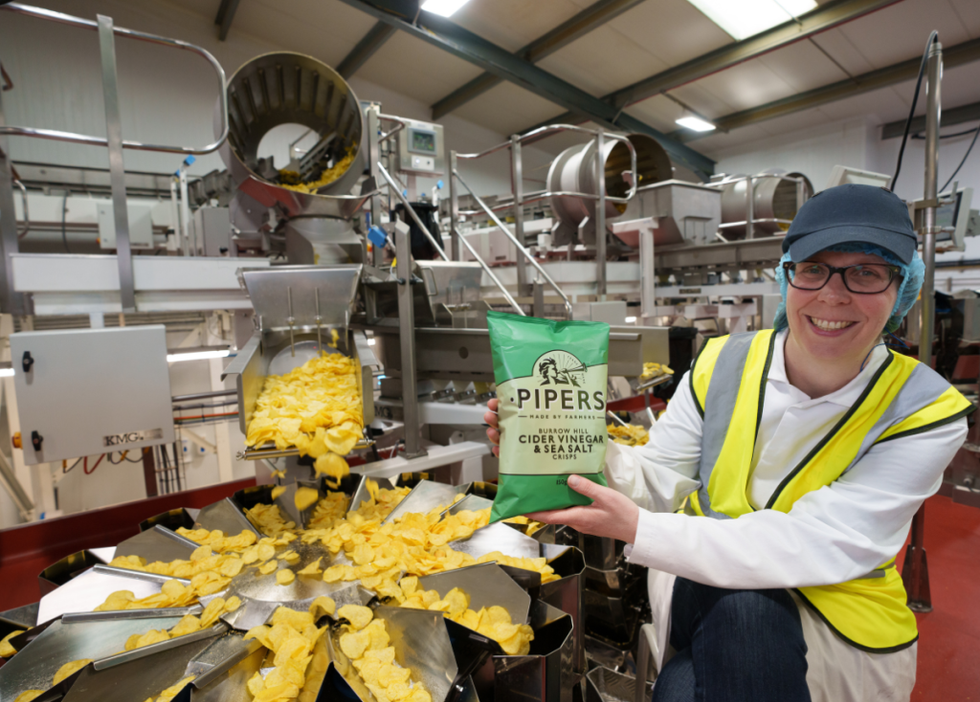Last year Asian Trader had a big in-depth interview with PepsiCo snacks guru Nic Storey, and we caught up with him again to get a bulletin on what’s commercially crispy in summer ’24
Last year, Asian Trader did a big Interview with Nic Storey, Senior Sales Director for Impulse & Field Sales at PepsiCo, for our summer focus on Crisps, Snacks and Nuts (CSN). This year we met Nic again for a catch-up to hear what he thinks is going on and what the near future of snacks trends looks like, especially since by now Covid is far in the rear mirror. So, are we back to the old normal? Are we there yet?
“I don't think we're back to 2019, pre-pandemic norm,” Nic answers. “I think the new norms have changed. Some categories are buoyant now and we can hardly keep up with snacks, which is one of the fastest growing categories. It's a nice problem to have. If you go to any store, whether it be a massive Tesco or a small independent, snacks is one of the highest-performing categories right now.”
CSN is one of the mainstays of the c-channel, so this is good news, and Nic is surprised by the astonishing rate of growth (“pretty amazing”), which is holding at nine per cent in impulse.
"In symbols and indies, CSN is worth £638 million, so this is a big, fast-moving category, and we're finding that retailers are getting behind the category as much as ever – not just because it's driving growth for their stores, but also because it's a category where there's a lot of innovation, and I think retailers enjoy getting behind that, because they know that local-store shoppers like to give things a go, and they get excited.”
As we like to say, it is the nimbleness of indie retailers, in coordination with fast-acting manufacturers, that keep the shelves interesting and alluring for customers, with NPD and offers, changing continually in a way that mults can never manage.
“They're not there to go into a small store to just have the same small, tight range week in, week out, and boring,” Nic agrees: indie shoppers need variety and action, novelty and new tastes, and CSN delivers.
One thing that dependably draws the punters in is the secret weapon of convenience: price-mark packs (PMP).
Trusty PMP
“PMP is the biggest and the fastest-moving part of the category,” Nic says, accounting for up to 70 per cent of c-channel sales in some categories – such as CSN. “That's a role PMPs are playing, and that's the way that shoppers in this channel can get the reassurance and make sure they're controlling their spend,”
The cost-of-living crisis continues across retail, of course, although grocery and especially convenience is somewhat protected – we are not selling furniture, after all, and people always need to eat. And to have fun while they’re at it, despite paying a little more than a mult price.
“People want that convenience, and even if something costs 10p more, they're happy to pay it," says Nic. "You can offer value in different ways, so people can bulk buy and get value that way [in mults and discounters], or they can buy smaller packs.
“What we're finding is that the reassurance of value that PMPs give in this channel is almost our bespoke way of trying to help consumers manage what they're spending. That moved across CSN from £1 to £1.25 across nearly every single manufacturer a couple of years ago, and that's bedded in really, really well.”
PMP is now the biggest and fastest-moving part of the CSN category, and it’s still a relatively new thing.
“Hearken back maybe 15 years and PMP barely existed,” Nic states, “so this really has grown pretty fast, pretty quick, over that period. It's the most important part of our CSN category, without doubt – in this channel – and what I really like, because I don't look after the groceries I look after this channel, and I'm really passionate about it, is that PMP is a differentiator, you know, that you don't get PMP in an Asda or a Sainsbury's or Morrison's or a Tesco.
“This is almost like our play, and this is our way of doing it, and I think that's another reason that retailers get behind it in this channel.”
It is interesting that in a period where many chains and suppliers are maintaining margin through stealth shrinkflation, the honesty of PMP is even a further selling point, no matter an increase to £1.25.
“Sometimes you can look at the grammage of packs, and sometimes you can look at the price. We decided that keeping the grammage the same, and in fact, in a couple of bags, even increasing it, was best,” says Nic.
"With Walkers Crisps, we actually put another five grams into those bags, up from 65g to 70g, to offset some of that, that step up in price – and it's landed really well, it's here to stay. That’s actually a pretty good size, and we find about half of consumption is someone on their own who wants a big eat, and about half is people using it as a small sharing bag. It bridges that single-bag-up-to-sharing-bag gap.”
Nostalgia and premium
Back catalogues are worth a lot of money – David Bowie sold his song rights for £200 million – and there are many brands that are still around or ripe for revival that have a great and increasing appeal. Nic believes this careful curation and merchandising of under-promoted jewels will also be a trend going forward, with nostalgia absolutely the new thing. The brands that have been around for decades are still goldmines.
“I just had a new starter in my team,” says Nic, “and he'd done all his research for the interview and everything. But even yesterday, when we were taking him through the portfolio, he was like, ‘I didn't realize Scampi Fries and Bacon Fries were ours,’ [both Smiths], or ‘I didn't realize about Frazzles and Chipsticks’.”
Nic explains that heritage brands, sometimes don't get the love they deserve: "Consumers love them, but they're out of sight, out of mind.”
He says those venerable but under-appreciated bags are seen as “value brands”: “So, whilst PMP is a great play for value for money, sometimes the value brands are lower tier. Walkers is our mainstream or mainstay brand, but then you've got Frazzles and Chipsticks and Cheetos that we're trying to do more with in this environment.”
Sales are way up, with lots more headroom available – nostalgia is the future!

Another impact of inflation and tight budgets is the paradoxical one of ongoing premiumisation – spending more on quality as a cheap treat – again, a space in which CSN thrives, and I mention to Nic the rise and rise of Pipers Crisps into the space occupied by brands such as Tyrrells and Kettle Chips, along with many other niche gourmet CSN brands, that appear to be hoovering up an ever larger part of the market.
"Pipers is the best crisp out there,” he declares proudly. "The flavors are so good. We bought the business in to really go into new spaces with it. We've got some amazing classics like cheese and salt and vinegar, but what's really important is the amazing provenance, and even though it's part of the PepsiCo family, we haven't touched that or diluted it one bit.”
Nic says that, for example, the sea salt flavour has to have all of its salt coming from Anglesey (tidal salt dried naturally from sea-water) and nowhere else. Likewise, the Longhorn beef has to come from Longhorn cattle in Berwick.
“We've kept to that, because it's got to be the best provenance and the best crisp out there, and we've just invested £8 million into the Piper's factory a few weeks ago. We've opened up the capacity enormously so that we can go after this brand. That doesn't mean it's going to go everywhere, because we know that it's got a role to play, and that role is mostly in the out-of-home or away-from-home channel, which includes the on-trade, but also convenience as well. “
Taking an originally on-trade brand such as Pipers into c-stores is partly what Nic means by innovation – a great and ongoing driver of c-channel sales. This leads us on to talk about another very interesting way PepsiCo is innovating: by swapping a type of snack and making the flavour the platform instead – all in the name of hotness.
Feeling chilli
“One of the trends that we've really got behind is hot and spicy," Nic enthuses. “It came over from the USA, and we're seeing it across Europe. There is a great propensity for UK shoppers to buy into hot and spicy, something like 51 per cent of UK consumers want to try it, the second highest benchmark across the whole of Europe, second only to Turkey, who are the top and love their spicy food."
It’s a phenomenon that’s been going on for a while and is gathering pace. PepsiCo launched Kurkure Masala Munch to great fanfare and success (and won an Asian Trader Award for it), and they are now expanding the hot and spicy concept to make the flavour the key, applying it across brands as an identifier in itself.
"What we've done very differently is this,” he explains. “We'll often launch a brand or a sub-brand, and then maybe three flavors underneath, but we've tipped the idea on its head. Instead, we've launched a flavour with three sub-brands underneath, so our Extra Flaming Hot is a ‘flavour platform’, and underneath that, we've got it in Wotsits Crunchy, Walkers Max and Doritos. The priority of the campaign has all been about heat and flavour, not a brand.”
So the flavour is the platform, got it. It’s a great concept.
“We do things well at scale,” Nic continues, “so we’ve put the Extra Flaming Hot into every channel, because we're a mainstream, big supplier and we need to please as many people as possible.”
This innovation spreads into all aspects of sales, including the merchandising of idea as well as product – and that is where theatrics comes in.
"The nuanced approach we took for convenience [with Extra Flaming Hot] was that we gave it a lot more love for the launch this year. I'm really proud that we brought over 20 independent and symbol retailers on board, engaged them before the launch so we could refine our launch plans, and then just gave them all of the armory to go ballistic on the launch. And we had the coolest engagement ever.
“Retailers had their tasting stations in the store, they were doing TikTok videos – we had one which involved him throwing a smoke grenade into his store, filling the whole store with billowing smoke before walking through and emerging with the product.”
Nic says he was confident it could go well, “but it went massive”. He says, “We gave ‘over-and-above' POS kit, like full arches and everything with fire extinguisher setups, to these retailers – and the halo effect of that is enormous.”
For Nic, the beauty of the c-channel (and he genuinely loves it) is the camaraderie and helpfulness:
“Impulse is a really harmonious channel in that people are keen to do well, but they're not elbows out and are keen to share best practice, share the love and learn from one another as entrepreneurs – and I really like that. We've lit the fuse, pardon the pun, and then it's really, really taken off in this channel. “
His prediction for the next year?
"Hot and spicy isn't just a flash in the pan, so I see that continuing, without doubt. I see the momentum on PMPs as well. I think those two areas, with a bit of nostalgia and reinvigoration of old brands.”







